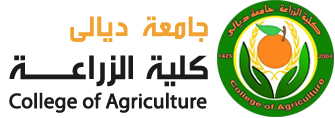The Department of Field Crops was established in 2011-2012 to join the other scientific departments in the Faculty of Agriculture / Diyala University in order to prepare cadres familiar with the latest agricultural expertise and techniques in our dear country and refine the country with agricultural specialties in particular the rehabilitation of specialists in the field of crop science. The scientific activities in the department are divided between classrooms, laboratories, crop fields as well as the research activity of the department’s employees.
The scientific interest of the graduates of the Field Crops Department is focused on the production of field crops, genetic improvement of these crops, improvement of production in quantity and quantity, study of the life of the bush and ways of combating it, and study of the most important environmental and physiological factors which affect crop productivity and quality recipes. In addition to the optimal use in the design of research experiments through the followers of statistical methods and design of appropriate experiments. The curriculum was programmed with high precision in both theoretical and practical sections to cover the academic and applied concepts of the types of knowledge in this specialty.
The vision of the crop department:
1- Submit the latest level of scientific material for students.
2. Continuous development of curricula and teaching methods.
3 – Active participation with other scientific departments associated with the department.
4 – Cooperation with the beneficiaries from outside the university.
Committees in the Department:
1. The Examination Committee
2- The Steering Committee
3- Scientific Committee
Laboratories:
1- Seed Technology Laboratory
2 – Laboratory of production of crops
3. Laboratory of Physiology of the bush
Activities of the Department:
1. Training courses.
2 – Participation in scientific conferences outside and inside the college.
3- To activate the productive role of field crops and feed
4- Dissemination of scientific research in international and local scientific journals.
5 – conducting applied scientific research.
6 – Cooperation with the relevant departments of the province in several projects.
7- Organizing exhibitions and extra-curricular activities.
